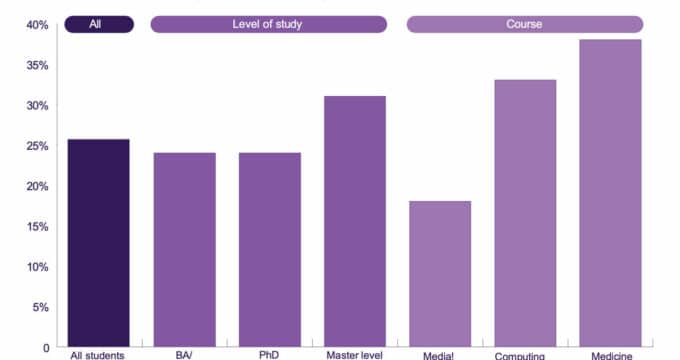AI tools help to smooth student housing search but supply crunch remains
- The student housing crisis persists
- Many international students are struggling so much to afford accommodation that it is affecting their quality of life and peace of mind
- Private investors are coming to the market with solutions, but more widespread fixes to the problem are urgently needed
- Several start-ups are using the power of AI to streamline the process of finding and booking accommodation for students
In universities and colleges around the world, and across the various sectors linked to international education, AI is revolutionising processes used to attract, enrol, and provide support for international students. This year, we are seeing more and more AI-based start-ups focused on student accommodation, and more private sector solutions addressing the problem of insufficient and unaffordable housing.
Background
Finding, and paying for, housing in host countries is an increasingly difficult challenge for international students. Demand far outstrips supply in every leading destination. The thousands of international students who arrive in both large and small cities every year is causing rents to skyrocket across the board, making housing unaffordable not just for students, but also for domestic families and senior citizens.
In Canada, for example, Ontario’s Auditor General Bonnie Lysyk wrote in her report, Value-for-Money Audit: Public colleges oversight, published in late-2021, that:
“We’ve had a substantial increase in international students, mostly at the community college level, though also at the university level, and we’ve built very little housing for this population. So what’s happened, naturally, as they need to live somewhere, is that it put stress on a number of markets, which has caused rents to rise, because there has been no offsetting increase in the size of the rental stock.”
She pointed to the provincial government’s underfunding of the college sector in Ontario as a main reason underlying the problem. Underfunded colleges have needed to enrol more and more international students to generate enough revenue to survive – and have done so regardless of whether there is sufficient housing for these students. Ms Lysyk wrote:
“At the heart of the issue of the growth of international enrolment is chronic and historical underfunding by the provincial government.”
In June 2023, University World News interviewed Mike Moffatt, a professor at the Ivey Business School, University of Western Ontario, who added:
“International students are the biggest victims of our inability to plan. They are not the ones causing the problem. They are among the ones having to suffer because of the problem. They are the ones who have to double and sometimes triple up [in housing units].”
National broadcaster CBC News interviewed students about their inability to find suitable finding, shown in this video.
In Europe, the demand-supply imbalance is just often just as acute. Major property agent Savills reported in 2022 that:
“Across the European cities Savills monitors, approximately 14,500 PBSA new beds were delivered in 2022 - yet this was still not enough to meet the increase in student numbers...On average across Europe, the public student housing market represents 63% of total PBSA beds, meaning the vast majority of existing stock is outdated and of relatively poor quality compared to private stock.”
Globally, the student housing market is seeing rent growth of more than 9%, reports Multi-Housing News.
Private sector working on affordable housing
In Canada, Quebec-based company UTILE, which calls itself “the only social economy organisation that specialises in student housing across Quebec,” is building thousands of new housing units for students. Underlying their model are several different sources of funding – municipal governments, student societies, and especially private investors, who account for 75-80% of UTILE’s total funding. Laurent Levesque, director general of UTILE, told University World News:
“What we’re developing is an alternative model of non-profit student housing that’s independent of colleges and universities [and] that is able to deliver thousands of units of affordable housing at a better price point. We build and operate the projects and charge students between 10% and 30% below market rates.”
Mr Levesque says UTILE’s plans “are less expensive than building social housing, for example – while still having a big impact on the rental market to bring it back to a point of balance for the benefit of everyone.”
AI start-ups make it easier and faster
A time-consuming endeavour for international students is hunting for accommodation in the cities where their college or university is located. Several new AI tools don’t necessarily solve the issue of insufficient supply, but they do make it much easier for students to find accommodation they can afford.
For example, University Living, a leading global student housing platform, has launched an AI-powered resource, StudentAccommodationGPT.ai, that:
- Matches students with suitable accommodation “in a matter of minutes,” showing them available options based on locality, budget, and other factors;
- Helps students to book accommodation, “enabling students to find their temporary homes with ease”;
- Allows students to understand the cost of living quickly with a “Cost of Living Calculator that considers one’s spending habits and that provides a personalised budget.”
Similarly, a new app called Housr, founded by university friends Harry Panter and Ben Clayton, eliminates administrative issues students must usually grapple with when trying to find housing. The app “lets students swipe through properties and secure viewings, while landlords and letting agents can use it as a management portal.”
Soon after its launch, Housr began generating revenue, illustrating (1) the dire need for services like these for international students and (2) the growing attractiveness of the student accommodation sector for investors and entrepreneurs. The Housr app is growing by over 1,000 new users every month, and “has partnered with 75% of all major university societies and has 3,600 properties on the platform, with a strong waiting list.”
Co-founder Harry Panter commented:
“I wish I had Housr when I was a student. You can order an Uber within three clicks. Why can’t you find a home the same way? Having met at university two years ago, Ben [his business partner] and I have been on a mission to revolutionise the way that the student property market works.”
More responsibility needed
As much as AI apps can help students to find a place to live more quickly, the inadequate supply of housing across destinations remains a very serious problem. Writing in The Conversation, Timothy Brunet, a sessional instructor in economics at the University of Windsor, says educators must factor this issue into their recruitment goals:
“Post-secondary institutions need to ensure they are connecting their recruitment strategies with local housing market data.”
He considers the student accommodation problem a crisis and says that solutions are urgently needed:
“Whether the solutions are dormitories, partnerships with private investors with specifically designed regulations and inspections, government-run housing or a combination of these strategies, student housing needs more policy and more planning. We need specific policies and regulations for student rentals that are based on housing as a human right.”
UTILE’s research supports Mr Brunet’s belief that when students must live in shoddy apartments, often crammed in with other students in the same situation, it robs them of the chance to make the most of their study abroad experience. It can even rob them of their mental health. A UTILE survey found that 42% of student respondents whose rent made up about 30% of their total budget said their mental health was either “strong” or “very strong.” When rent took up at least 70% of students’ income, the percentage saying they had strong or very strong dropped by 5% – and more than a quarter of those students (29%) said their mental health was either “very fragile” or “fragile.”
Lack of housing could depress demand for study abroad
In a recent student survey conducted by IDP nearly two-thirds of Chinese students said they wanted to make sure they had accommodation confirmed before travelling to their study destination. Most said that they would not travel at all without a confirmation of housing.
Significant proportions of students in other key Asian markets, including Thailand and the Philippines, also said that their study plans hinged on advance confirmation of housing.
For additional background, please see:
















